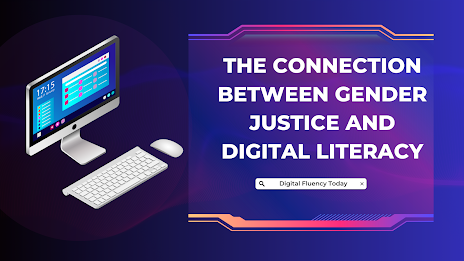The Connection Between Gender Justice and Digital literacy
Empowering Women Through Digital Literacy and Gender Justice.
Gender justice and digital literacy are two issues that may not seem immediately connected, but in reality, they are deeply intertwined. Digital literacy refers to the ability to use and navigate digital technologies effectively, while gender justice is the pursuit of equal rights and opportunities for people of all genders. In today's world, digital literacy is becoming increasingly important. With the rise of technology, many jobs require digital skills, and access to the Internet is essential for education, communication, and social interaction. However, not everyone has equal access to digital technologies, and this can have a significant impact on their lives. This is where gender justice comes in. This blog will explore the connection between gender justice and digital literacy and why it is important for promoting equality and empowerment.
Access to technology is essential for participation in today's society. The digital divide, however, is a reality, with many people being left behind due to a lack of access to technology or the ability to use it effectively. This divide disproportionately affects women and girls, who are more likely to face barriers to accessing technology and the internet. According to a report by the United Nations, women are 23% less likely than men to have access to the internet in developing countries.
Women and girls can suffer significant consequences due to a lack of access to technology and digital literacy skills. It can limit their educational, employment, and entrepreneurship opportunities, as well as their ability to connect with others and participate in social and political activities. This has the potential to perpetuate gender inequality and exacerbate existing power imbalances. This can result in social isolation as well as a lack of opportunities for personal and professional development.
Digital literacy can help to bridge this gap and promote gender justice. By providing women and girls with the skills and knowledge they need to use technology effectively, they can become more empowered and better able to participate in society. This includes being able to access information, communicate with others, and use technology to create and share their own content. This will not only benefit women but also society as a whole. When women have access to digital technologies, they can participate more fully in the economy, politics, and social life. This can lead to greater innovation, creativity, and productivity.
Digital literacy can also aid in the dismantling of gender stereotypes and the promotion of diversity and inclusion. Women and girls can challenge traditional gender roles and increase representation in fields such as science, technology, engineering, and mathematics (STEM) by using technology to showcase diverse voices and perspectives.
Furthermore, digital literacy can enable women and girls to become entrepreneurs and start their own businesses. With the rise of e-commerce and online marketplaces, digital literacy skills are becoming increasingly important for entering new markets and reaching customers all over the world.
So, what can we do to promote both digital literacy and gender justice? One important step is to provide women with equal access to digital technologies. This can be done through policies that promote access to the internet, digital devices, and digital skills training. It is also important to address the social and cultural barriers that prevent women from accessing digital technologies, such as gender stereotypes and discrimination.
To sum it up, digital literacy is a critical tool for promoting gender justice and empowering women and girls. By providing access to technology and the skills needed to use it effectively, we can break down barriers and promote equality and inclusion. It is essential that we work towards closing the digital divide and ensuring that everyone has the opportunity to benefit from the opportunities that technology provides.

.png)
.png)
Comments
Post a Comment